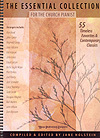- |
User Links
353
Rejoice, O Pure in Heart
Hymn Information
- First Line
- Rejoice, O pure in heart!
- Author (attributed to)
- Edward H. Plumpre (1866, alt.)
- Tune Name
- MARION
- Composer
- Arthur H. Messiter (1883)
- Topic
- Biblical Names and Places: Jerusalem · Communion of the Saints · Doxologies · Jesus Christ: Confidence in · Joy · Occasional Services: New Year · Perseverance · Walk with God
Copyright Information
- Text Copyright
- Public Domain
- Tune Copyright
- Public Domain
- Reprint/Projection Information
- Words and Music: The Words and Music are in the Public Domain; you do not need permission to project or reprint the Words and Music.
Full Text
Scripture References
Further Reflections on Scripture References
In this text the imagery of a liturgical procession becomes a marching metaphor for the journey of life. The call to "rejoice, give thanks and sing" (st. 1) is extended to all people, "bright youth and snow-crowned age, both men and women" (st. 2), and on all occasions, "by night and day, in gladness and in woe" (st. 3). Life's pilgrimage has a specific goal, to be at rest in the new Jerusalem (st. 4) where all God's creatures will join in a great doxology (st. 5). The "rejoice" theme in the refrain is borrowed from Philippians 4:4.
Psalter Hymnal Handbook
353
Rejoice, O Pure in Heart
Call to Worship
To those who are sanctified in Christ Jesus,
called to be saints,
together with all those who in every place
call on the name of our Lord Jesus Christ,
both their Lord and ours:
Grace to you and peace
from God our Father and the Lord Jesus Christ.
—1 Corinthians 1:2-3, NRSV
—
Worship Sourcebook Edition Two
Blessing/Benediction
Optional charge and blessing (1 Thess. 5:16-24)
Rejoice always, pray continually, give thanks in all circumstances;
for this is God’s will for you in Christ Jesus.
Do not quench the Spirit.
Do not treat prophecies with contempt but test them all;
hold on to what is good, reject every kind of evil.
May God himself, the God of peace, sanctify you through and through.
May your whole spirit, soul and body be kept blameless
at the coming of our Lord Jesus Christ.
The one who calls you is faithful, and he will do it.
—
Lift Up Your Hearts (http://www.liftupyourheartshymnal.org)
353
Rejoice, O Pure in Heart
Tune Information
- Name
- MARION
- Key
- F Major
- Meter
- 6.6.8.6 refrain 4.6
Recordings
353
Rejoice, O Pure in Heart
Hymn Story/Background
Anglican clergyman Edward H. Plumptre wrote this text for use as a processional hymn for the annual choral festival at Peterborough Cathedral, England (May 1865). "Rejoice, O Pure in Heart" was originally in eleven stanzas-long enough for all the choirs to process into the cathedral. It was published in the third edition of Plumptre's Lazarus and Other Poems (1868) and in the Appendix to Hymns Ancient and Modern (1868).
In this text, the imagery of a liturgical procession becomes a marching metaphor for the journey of life. The call to "rejoice, give thanks and sing" (st. 1) is extended to all people, "bright youth and snow-crowned age, both men and women" (st. 2), and on all occasions, "by night and day, in gladness and in woe" (st. 3). Life's pilgrimage has a specific goal, to be at rest in the new Jerusalem (st. 4) where all God's creatures will join in a great doxology (st. 5). The "rejoice" theme in the refrain is borrowed from Philippians 4:4.
Arthur H. Messiter composed MARION for this text in 1883 and named it after his wife. The tune was published in the Hymnal with Music as Used in Trinity Church (1893), a hymnal compiled by Messiter during his long term of service as organist/choirmaster at Trinity Church (Episcopal) in New York City (1866-1897).
—
Bert Polman
Author Information
Edward H. Plumptre (b. London, England, August 6, 1821; d. Wells, England, February 1, 1891) was an eminent classical and biblical scholar who gained prominence in both church and university. Educated at King's College, London, and University College, Oxford, he was ordained in the Church of England in 1846. Plumptre served as a preacher at Oxford and a professor of pastoral theology at King's College, and held a number of other prestigious positions. His writings include A Life of Bishop Ken (1888), translations from Greek and Latin classics, and poetry and hymns. Plumptre was also a member of the committee that produced the Revised Version of the Bible.
—
Bert Polman
Composer Information
Educated by private tutors in England, Arthur H. Messiter (b. Frome, Somersetshire, England, 1834; d. New York, NY, 1916) immigrated to the United States in 1863 and had an active musical career in Philadelphia, which included an organist position at St. James the Less. At Trinity Church in New York City, he modeled with distinction the British cathedral tradition of music. Messiter was an editor of the Episcopal Hymnal (1893), compiled the Psalter (1889) and Choir Office Book (1891), and wrote a musical history of Trinity Episcopal Church, New York (1906).
—
Bert Polman
Suggestions or corrections? Contact us


 My Starred Hymns
My Starred Hymns






